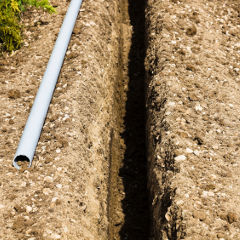
The excavation of gas lines, water lines, or sewer lines is something that should be handled by professionals. Excavating any sort of utility lines can be a major hazard, and should only be undertaken by those who truly know what they are doing. Digging to lay down new natural gas lines, new water lines, or sewer lines could result in striking old gas lines, electric lines, or pipelines for other utilities, and digging around gas lines, water lines, or sewer lines pose the same problems.
Explosions can result when excavation around these lines if you are not following the proper procedures. This is why 911 or other emergency responders need to be contacted immediately if you strike an existing gas line or other underground utility pipeline during excavation. The pipeline operator would also need to be called immediately in the event of such an emergency. No delay should be taken when contacting emergency services and the pipeline operator; even the slightest time delay makes an explosion much more likely.
To maximize safety, all excavators (whether working on natural gas lines or not) should create an emergency response plan that is specifically tailored to the site they are working on. They should also ensure that all the employees working at that site know the action plan in the event of a gas line or other utility line being punctured or any other hazardous incidence.
To help prevent problems such as this, excavation professionals should consult any available construction plans in the area they are working in. A correctly made plan will detail any utility lines coming to or from a property.
You should also check with other utilities in the area in advance to be sure that there are no lines you will hit while excavating. Know the color coding system in your area for what utilities are which, and use your own line markers, paint, flags, or other markings to keep track of where these other lines are located. If these markings are over 15 days old, have them remarked to be sure that they are current and that someone hasn’t altered them. The most important part of excavation is to educate employees on the signs of a gas leak. If they smell rotten eggs, hear an unusual hissing sound, or see soil changes and dying vegetation, they need to know that they need to tell someone right away.
Underground electrical lines also present a great hazard. Not only could you create a risk for fire or electrocution if one of these lines are struck, but you could also create a power outage that is dangerous for others.
Excavation for natural gas, water, or sewer lines should be something that is always handled by professionals. Improper excavation could lead to a lot of headaches and possibly even death if an existing gas or electric line is struck and proper protocols are not followed. Don’t just casually choose a contractor; make sure they are licensed and come with good references.




